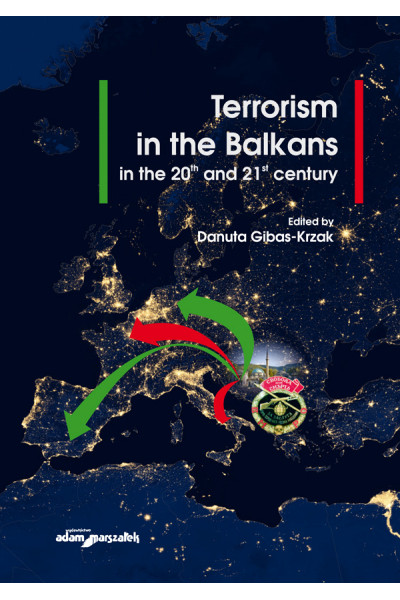- Out-of-Stock



Terrorism in the Balkans in the 20th and 21st century
Editor of the volume: Danuta Gibas-Krzak
The Balkans are often called „Balkan powder keg”. Therefore, it is good that work about terrorism in the Balkans was created, and the authors deserve recognition for facing such significant and difficult problem. I may say that, with no exception, all authors showed skills in discourse at high substantive level, creating original texts, full of analyses, opinions and reflections.
prof. dr hab. Marek Bankowicz
The monograph is based on broad subject literature. Apart from archival materials from archives in Zagreb, Belgrade, Athens and Sarajevo, the monographs describing complicated history of the Balkans and presenting current reality were also used. The following subjects were presented in particular articles:
Dariusz Gregorczyk (Jan Długosz University, Czestochowa, Poland) presented terrorist and ideological aspects of activity of Internal Macedonia Revolutionary Organization (IMRO). Their terrorist actions were aimed at declining Ottoman Empire. The author showed fear that Macedonian „death squadrons” spread among population, committing murders and carrying out spectacular attacks on rich members of Turkish families.
Andrzej Krzak (Jan Długosz University, Czestochowa, Poland), applying method of case study, presented terrorist actions of active intelligence of the Comintern and Soviet intelligence services in Bulgaria in the 1920s.
Andrzej Dubicki (University of Lodz, Poland) described activity of terrorist of Iron Guard, political organization active in Romania during the interwar period. Its death commando units carried out attacks on high government officials (assassination of the Prime Minister) and public buildings.
Danuta Gibas-Krzak (Jan Długosz University, Czestochowa, Poland) presented circumstances of an assassination attempt on the King Alexander I, organized in Marseille in 1934 by Croatian and Macedonian separatists. The author, on the basis of source materials from the archives in Serbia and Croatia, presented practically unknown threads concerning the participation of intelligence services of Germany, Italy and Hungary in organization of the attack on the king of Yugoslavia and Louis Barthou, French minister of foreign affairs.
Nikica Barić (Croatian Institute of History, Croatia) presented political terrorist actions taken by Independent Croatian State, which was established during the Second World War. He focused on war crimes committed in Brčko by Croatian separatists against ethnic minorities such as Jews and Serbs.
Tomasz Stala (University of Warsaw, Poland) analysed terrorist activity of Kosovo Liberation Army in the perspective of history of Kosovo. He showed how the actions of Albanian separatists have become the factor of destruction of Yugoslavia that was established after the Second World War.
Justyna Kędziora-Płachciak (Brussels, Belgium) conducted a deepened analysis of current terrorist threats in Bosnia and Herzegovina, of which main source is Islamic fundamentalism. She presented specific aspects of terrorism in post-Yugoslavian countries in legislative perspective with reference to international organizations and Balkan specificity.
Jelena Vukoičić (University of Belgrade, Serbia) presented recent aspects of Islamic terrorism in the Balkans. The deliberations of the author led to conclusions that this region of Europe is particularly exposed to penetration of radical Islam and its terrorist cells. It results from its historical determinants, that is, the rule of Ottoman Empire in the Balkans, weakness of political systems and asymmetric threats of our times such as: organized crime, migration crisis, corruption. The Balkans are not ready to confront these threats, the future of this region is uncertain and depends on the policies of European countries.
Ioannis Michaletos (Institute for Security and Defence Analysis in Athens, Greece) presented in his article contemporary terrorist threats in Greece, taking the presence of Islamic terrorist cells and their connections with non-governmental organizations into consideration. He has proven that Greece is a transit zone for international terrorism, which is a threat for security of Europe.
Mateusz Rakowski (University of Warsaw, Poland) formulated in his article a thesis that Muslim extremism in the Balkans has created good conditions for development of global terrorist organizations. The Balkans seem to be one of the most important connection between organizations from the Middle East (especially ISIS) and the goal of their expansion into north. The author paid attention to the fact that one of the most dangerous aspects is training future terrorists, especially in a form of „white” Jihad.
Desirée Pangerc (CIELS University Campus – Padova, Italy) presented the results of recent research on illegal immigrants, terrorism and safety on the border between Italy and Western Balkans from anthropological perspective.